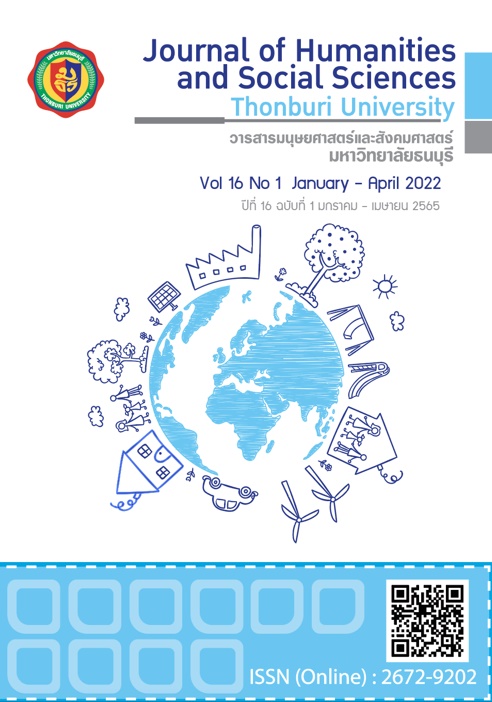กระบวนการพัฒนาหลักสูตรภาษาอังกฤษเพื่อการสื่อสารการท่องเที่ยวเชิงวัฒนธรรมสำหรับผู้สูงอายุ: กรณีศึกษาชุมชนเดิมบางนางบวช จังหวัดสุพรรณบุรี
คำสำคัญ:
ภาษาอังกฤษ, การพัฒนาหลักสูตร, การท่องเที่ยวเชิงวัฒนธรรม, ผู้สูงอายุบทคัดย่อ
งานวิจัยนี้มีวัตถุประสงค์เพื่อพัฒนากระบวนการการพัฒนาหลักสูตรภาษาอังกฤษการท่องเที่ยวเชิงวัฒนธรรมสำหรับผู้สูงอายุในชุมชนเดิมบางนางบวช จังหวัดสุพรรณบุรี เครื่องมือวิจัยใช้แบบสอบถาม การสัมภาษณ์เชิงลึก การสนทนากลุ่มย่อย และการสังเกตการณ์แบบมีส่วนร่วม โดยเก็บข้อมูลจากผู้สูงอายุ 21คน สุ่มเลือกแบบเจาะจง วิเคราะห์ข้อมูลเชิงปริมาณด้วยสถิติเชิงพรรณนาและเชิงเนื้อหา ผลการวิจัยพบว่า ผู้สูงอายุแสดงความสนใจและมีส่วนเข้าร่วมพัฒนาทักษะด้านภาษาอังกฤษพื้นฐานอย่างจริงจังในกระบวนการพัฒนาหลักสูตร ทั้งนี้ กระบวนการพัฒนาหลักสูตรภาษาอังกฤษสำหรับการสื่อสารเชิงวัฒนธรรมสำหรับผู้สูงอายุได้ถูกพัฒนาอย่างมีประสิทธิภาพ สามารถช่วยพัฒนาความรู้ด้านภาษาอังกฤษให้แก่กลุ่มผู้เข้าร่วมได้ ดังผลคะแนนก่อน-หลังฝึกอบรมพบว่า คะแนนหลังฝึกอบรมสูงกว่าคะแนนก่อนฝึกอบรมอย่างมีนัยสำคัญทางสถิติที่ระดับ .05
เอกสารอ้างอิง
Bilbao, P. P., Lucido, P. I., Iringan, T. C., Javier, R. B., (2008). Curriculum development. Quezon City: Lorimar Publishing.
Brown, J. D. (1995). The Elements of Language Curriculum A Systematic Approach to Program Development. Boston: MA Heinle & Heinle.
Clark, J. (1997). Educational Research: Philosophy, Politics, Ethics. Palmerston North: ERDC Press Massey University.
Colardyn, D. & Bjornavold, J. (2004). Validation of Formal, Non-Formal and Informal Learning: policy and practices in EU Member States. European Journal of Education. 39 (1): 69-89.
Dudley-Evans, T. and St. John, M.J. (1998). Developments in English for Specific Purposes: A multidisciplinary approach. Cambridge: Cambridge University Press.
Association of Southeast Asian Nations. (2018). Thailand (National level): National Strategy (2018-2037). Retrieved October 12, 2020, from http://www.fao.org/faolex/results/details/en/c/LEX-FAOC200834/
McFadden, J.R., & Roehrig, G.H. (2017). Exploring teacher design team endeavors while creating an elementary-focused STEM-integrated curriculum. International Journal of STEM Education. 4(1): 21.
Ministry of Tourism & Sports. (2020). Tourism in Thailand: Annual Statistics 2017-2020. Retrieved September 27, 2020, from www.mots.go.th/more_news_new.php?cid=414
Murphy, P.E. & Murphy, A.E. (2004). Strategic management for tourism communities: Bridging the gaps. Clevedon: Aspects of Tourism Series Channel View Publications.
Rungsimanwong, C. (2014). The Development of Local Curriculum on Chonburi Ban Rao with ASEAN Community Taught by E-learning Method for Vocational Certificate Students. (Master of Education Thesis, Rajanagarindra University).
Taba, H. (1962). Curriculum development Theory and practice. New York Harcourt: Brace & World.
Association of Southeast Asian Nations Secretariat. (2016). ASEAN Community Based Tourism Standard. Retrieved October 5, 2020, from www.asean.org/wp-content/uploads/ 2012/05/ASEAN-Community-Based-Tourism-Standard.pdf
Thongsri, S. (2009). The Development of Training Curriculum for Teaching English by Using Communicative Approach for Primary School Teachers with No English Teaching Degree at Preparatory Level. (Master of Education Thesis, Thaksin University).
ดาวน์โหลด
เผยแพร่แล้ว
รูปแบบการอ้างอิง
ฉบับ
ประเภทบทความ
สัญญาอนุญาต
ลิขสิทธิ์ (c) 2021 thaweesak chanpradit

อนุญาตภายใต้เงื่อนไข Creative Commons Attribution-NonCommercial-NoDerivatives 4.0 International License.
ผลงานที่ปรากฎในวารสารฉบับนี้เป็นลิขสิทธิ์เฉพาะส่วนบุคคลของผู้เขียนซึ่งต้องรับผิดชอบต่อผลทาง กฎหมายที่อาจเกิดขึ้นได้และไม่มีผลต่อกองบรรณาธิการ






